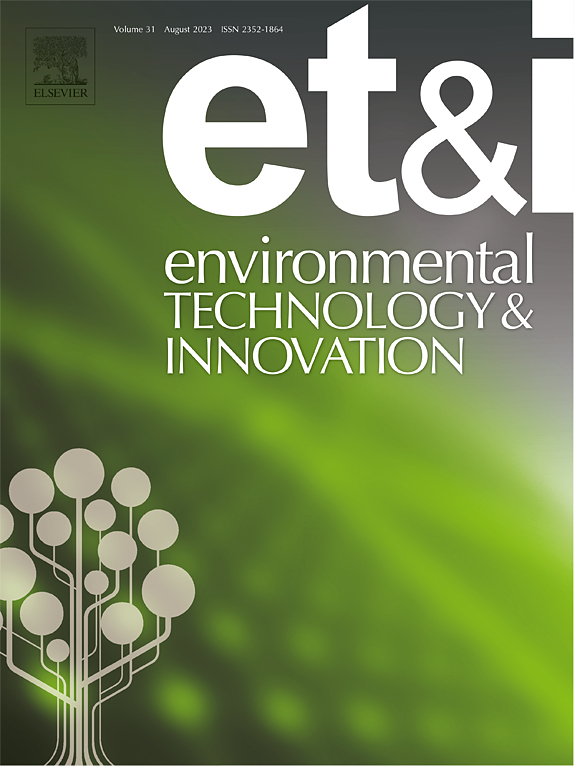Remediation of Pb and Cd contaminated sediments by wheat straw biochar and microbial community analysis
IF 7.1
2区 环境科学与生态学
Q1 BIOTECHNOLOGY & APPLIED MICROBIOLOGY
引用次数: 0
Abstract
Wheat straw biochar (BC) or modified wheat straw biochar (MBC) could affect the aggregate structure of soil, effectively adsorb heavy metal and reduce the bioavailability of heavy metals in soil. TGA, BET, FTIR and SEM were used to characterize the surface morphology and structure of BC and MBC. The adsorption properties of BC and MBC on Pb(II) and Cd(II) in solution systems were investigated by batch experiments, and the remediation performance of Pb and Cd contaminated sediment by BC or MBC were studied by pot experiments. The results showed that MBC had a larger specific surface area of 46.04 m2/g and total pore volume 0.0555 cm3/g; the adsorption isotherms of Pb(II) and Cd(II) for BC and MBC were more suitable for Langmuir model (R2 over 0.91), and the maximum adsorption capacities of Pb(II) and Cd(II) by MBC could reach 71.14 and 115.64 mg/g, respectively. BC or MBC promoted the transformation of Pb and Cd from the extractable acid fraction to the oxidizable and residual fraction, reduced the migration of heavy metals and enhanced the stability of aggregates. Therefore, the results provided a perspective for the dredged contaminated sediments used as planting soil. In addition, BC or MBC, as soil amendments, could improve the abundance of microbial community. At the phylum level, the main dominant bacteria were Proteobacteria and Bacteroidetes.
小麦秸秆生物炭对铅和镉污染沉积物的修复及微生物群落分析
小麦秸秆生物炭(BC)或改性小麦秸秆生物炭(MBC)可影响土壤的团聚结构,有效吸附重金属,降低土壤中重金属的生物利用率。利用 TGA、BET、傅立叶变换红外光谱和扫描电镜表征了 BC 和 MBC 的表面形态和结构。批量实验研究了 BC 和 MBC 在溶液体系中对铅(II)和镉(II)的吸附性能,盆栽实验研究了 BC 或 MBC 对铅(II)和镉(II)污染沉积物的修复性能。结果表明,MBC 的比表面积为 46.04 m2/g,总孔容积为 0.0555 cm3/g;BC 和 MBC 对铅(II)和镉(II)的吸附等温线更适合 Langmuir 模型(R2 超过 0.91),MBC 对铅(II)和镉(II)的最大吸附容量分别可达 71.14 和 115.64 mg/g。BC 或 MBC 可促进铅和镉从可萃取酸组分向可氧化组分和残余组分的转化,减少重金属的迁移,并增强聚集体的稳定性。因此,研究结果为将疏浚污染沉积物用作种植土提供了一个视角。此外,BC 或 MBC 作为土壤改良剂可提高微生物群落的丰度。在门级水平上,主要优势菌是变形菌和类杆菌。
本文章由计算机程序翻译,如有差异,请以英文原文为准。
求助全文
约1分钟内获得全文
求助全文
来源期刊

Environmental Technology & Innovation
Environmental Science-General Environmental Science
CiteScore
14.00
自引率
4.20%
发文量
435
审稿时长
74 days
期刊介绍:
Environmental Technology & Innovation adopts a challenge-oriented approach to solutions by integrating natural sciences to promote a sustainable future. The journal aims to foster the creation and development of innovative products, technologies, and ideas that enhance the environment, with impacts across soil, air, water, and food in rural and urban areas.
As a platform for disseminating scientific evidence for environmental protection and sustainable development, the journal emphasizes fundamental science, methodologies, tools, techniques, and policy considerations. It emphasizes the importance of science and technology in environmental benefits, including smarter, cleaner technologies for environmental protection, more efficient resource processing methods, and the evidence supporting their effectiveness.
文献相关原料
公司名称
产品信息
麦克林
HNO3
麦克林
NaCl
麦克林
HCl
麦克林
NaOH
阿拉丁
[Co(NH3)6]Cl3
 求助内容:
求助内容: 应助结果提醒方式:
应助结果提醒方式:


